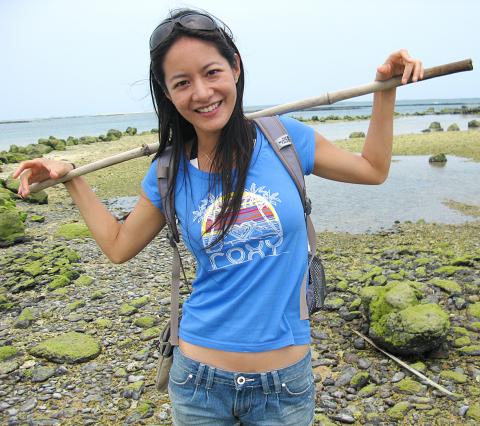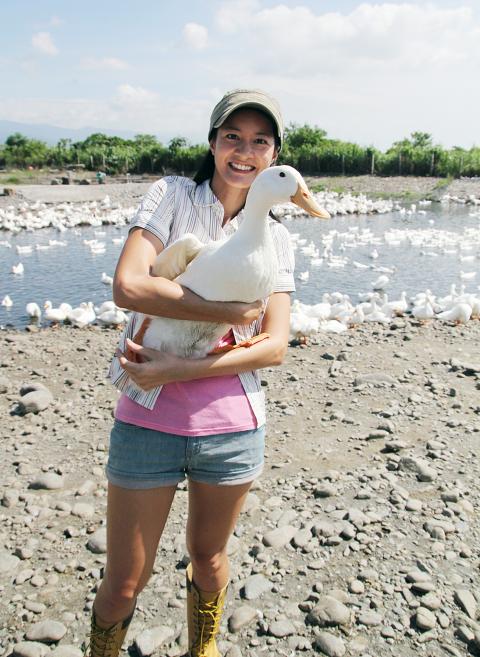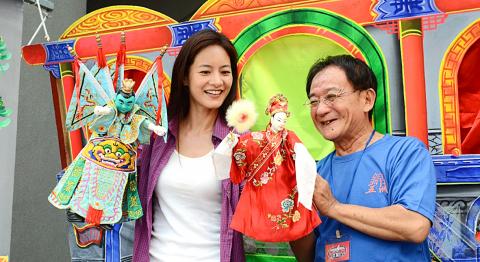Janet Hsieh (謝怡芬) is everywhere. Her image graces supermarket aisles, delivery vans and bus shelters. But there is one of her in a pink cowboy hat, from a few years ago promoting Fun Taiwan, that stands out. Side on, head tilted, lips pursed, with fingers pointed up toward them like a gun, she appears quite the pastiche cowgirl.
It seems an appropriate appellation. Cowboys were frontiersmen, using their wits to charm and conquer, and push America’s territory westward. In the process, they formed a new national identity built on adventure and charisma. Is Hsieh doing the same in Taiwan?
She has certainly made the spirit of adventure her metier.

Photo courtesy of TLC
Cowboys, as pioneers, were the masters of reinvention, and like many a migrant before her, so is Hsieh, and it seems the MIT graduate is following in her mother’s footsteps. When Hsieh speaks, she has the air of confiding something, which has obviously helped in creating the link between her and her TV viewers; her phrasing is short and simple, which again gives the directness and intimacy that make up her appeal; and “show, don’t tell” comes naturally to her, giving ample examples to illustrate her points, like all good communicators.
“That is part of the nature of my family. Like my mother, [in Taiwan] she studied homemaking and then she went to the US, and she was like, ‘You know what, I want to get a career, I wanna study accounting, I want to get my CPA. I want to become the top position.’ So in a way she kind of went against tradition in her family’s mind.”
While tradition is a part of Hsieh’s story, migration, reinvention and change predominate.

Photo courtesy of TLC
With Fun Taiwan, she introduced Taiwan to reality TV in the form of a global competition to win NT$1 million as Hsieh’s co-host. The program has all the reality TV gimmicks we have come to expect: the elimination nail-biters, the tears, the heart-to-heart pieces, while still getting non-Taiwanese to experience Taiwan, and for Taiwanese to see their country through foreign eyes.
But Hsieh is also breaking new ground in terms of second-generation Taiwanese, and arguably for Taiwanese women, and this is closer to the forging of a new national identity.
Prodigal daughter

Photo courtesy of TLC
“Look at these suckers!” she says on an episode of Fun Taiwan, as she hoists up two 10kg fish she caught in Penghu. Coming from a pure Taiwanese — or a pure American — it would sound different — more artificial, perhaps, or more brash.
Hsieh is East with a lot of West; an ABT (American Born Taiwanese), and the “Janet magic” is this special recipe, presented at the right place, at the right time. It has been her lightning rod.
So, Hsieh isn’t just a cowgirl. She’s also a native. When she first came to Taiwan in September, 2001, she couldn’t speak three words of Chinese. She spoke something much better: Taiwanese. For audiences, this gave her genuine, bonafide credentials and immediate entry into people’s homes and hearts. Her agent knew it and one of her early advertisements for cough medicine cashes in on this.
On Fun Taiwan, she shines a light into remote parts of Taiwan with her TV crew, illuminating traditional and obscure industries and customs for an English, Mandarin and Taiwanese-speaking audience. Communities open up to her, because she is also one of them. From shell fishing and cactus farming to stone masonry, she manages to elevate the banality of the day-to-day into something core to the story of Taiwan.
While it is a stretch applying the Prodigal Son tale to Hsieh, it is instructive, because while her parents left the homeland, Hsieh chose to return for good in late 2002, and because of this, she found herself embraced. Taiwan wanted to re-find what was lost, and it became Hsieh’s promised land.
“Taiwan was just opportunity. I was like, ‘Wow! there is so much I can do here.’ The fact that I was [a volunteer] in the emergency room and then I was doing commercials: I made that jump. I never thought that would happen. I would never… if I was somewhere else in the US,” Hsieh says. “I had no idea Taiwan had this much. I had no idea we had snow in the mountains. I had no idea the best surfing was down south. It was a shock and I loved it.”
Swimming against the tide
From the 1960s onward, many of Taiwan’s brightest and best-educated have been leaving. It was the dream of countless generations to become Americans, Hsieh’s parents among them.
US-born, raised and educated, Hsieh never worked a day in the US: Her first job was in Taiwan after volunteering in India. So perhaps she is an example of a new type of remigration, stubbornly at odds with her parents’ American dream.
“In college I was always the rebel of the group. I was always the one who was trying to get people to basically steal our lobby chairs and do races down the hallway. I was always the one who was looking for adventure.”
Hsieh often does things unexpected, even unbecoming. You can see it in Fun Taiwan, with the goofy smiles and laughs, and the slapstick of her operating heavy machinery or the cumbersome motorbikes, tourist trains and other vehicles she uses to take audiences around Taiwan.
Change and body image
But Taiwanese accept things about her that perhaps they would not in others. This gives her a particular ability, as a model and a TV personality, to shift the foundations of what is considered appropriate or beautiful in a woman.
Hsieh has just returned from a running trip hosted by Tourism Australia to the Gold Coast, locally known as the “glitter strip” for its Las Vegas-style casinos and hotels strung along some of the country’s most pristine white beaches. She is sporting a new fringe and her skin glows a healthy bronze. She is wearing legging bottoms and sporty pumps.
At 33, Hsieh says she is “comfortable” with how she looks. This may come as a surprise to her fans, but there is a deeper message about someone like Hsieh struggling with Taiwan’s ideals of behavior and beauty. Sporting a tan, being outdoorsy are notions of beauty that are slowly infiltrating Taiwan’s fashion-conscious youth, while in the process inching the axis of the national psyche a little westward.
“When I first arrived, I thought I had to be pale and skinny to succeed, but that didn’t work out for me. When I started to be myself and not try and conform to any standard, I realized that I was so much healthier and happier as a tanned, outdoor-loving, athletic [woman],” she says.
Perhaps in 10 years, today’s common fears of allowing even a ray of sun to fall on porcelain skin, or exercise leading to masculine and muscular calves, will sound antiquated.
“I want to encourage women to be in touch with their feminine side: [to be] comfortable in your body in your own way. I want to show that this is me: I’ve finally gotten to where I’m comfortable.”
Flower vases
Making dominance and intelligence, and not just prettiness, mainstream components of female attractiveness in the media industry is again something Hsieh has the potential to help change.
“You do find that the main hosts are men … and there are very few women, they are usually the side roles, they are huapin [花瓶, flower vase]: You have to stand around and look pretty,” Hsieh says.
“If you’re a host, you need to own that stage, and if you’re a woman and you do it — look at Oprah, Ellen in the US — we need to be just has commanding as a man is,” she says.
Hsieh does “own her show” in that she has made it hers, in her signature style, and her mind is not limiting her. She contributes ideas, direction and writes the scripts.
“It fulfills me, because my job is about throwing me out there and making me study on a daily basis in a way that I love. I am constantly trying to push my limit,” she says.
In fact, she is career-focused to the point where a question about getting married seems to rattle her.
“It would be difficult for me to settle down. How would I start a family with me running around? It’s weird ... My parents would eventually want me to find someone and settle down, but they understand it is difficult for me right now.”
For Hsieh, perhaps, there are more boundaries to be pushed and even more reinvention and change.

Taiwan has next to no political engagement in Myanmar, either with the ruling military junta nor the dozens of armed groups who’ve in the last five years taken over around two-thirds of the nation’s territory in a sprawling, patchwork civil war. But early last month, the leader of one relatively minor Burmese revolutionary faction, General Nerdah Bomya, who is also an alleged war criminal, made a low key visit to Taipei, where he met with a member of President William Lai’s (賴清德) staff, a retired Taiwanese military official and several academics. “I feel like Taiwan is a good example of

March 2 to March 8 Gunfire rang out along the shore of the frontline island of Lieyu (烈嶼) on a foggy afternoon on March 7, 1987. By the time it was over, about 20 unarmed Vietnamese refugees — men, women, elderly and children — were dead. They were hastily buried, followed by decades of silence. Months later, opposition politicians and journalists tried to uncover what had happened, but conflicting accounts only deepened the confusion. One version suggested that government troops had mistakenly killed their own operatives attempting to return home from Vietnam. The military maintained that the

Before the last section of the round-the-island railway was electrified, one old blue train still chugged back and forth between Pingtung County’s Fangliao (枋寮) and Taitung (台東) stations once a day. It was so slow, was so hot (it had no air conditioning) and covered such a short distance, that the low fare still failed to attract many riders. This relic of the past was finally retired when the South Link Line was fully electrified on Dec. 23, 2020. A wave of nostalgia surrounded the termination of the Ordinary Train service, as these train carriages had been in use for decades

Lori Sepich smoked for years and sometimes skipped taking her blood pressure medicine. But she never thought she’d have a heart attack. The possibility “just wasn’t registering with me,” said the 64-year-old from Memphis, Tennessee, who suffered two of them 13 years apart. She’s far from alone. More than 60 million women in the US live with cardiovascular disease, which includes heart disease as well as stroke, heart failure and atrial fibrillation. And despite the myth that heart attacks mostly strike men, women are vulnerable too. Overall in the US, 1 in 5 women dies of cardiovascular disease each year, 37,000 of them